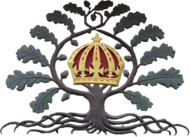
A | B | C | D | E | F | G | H | CH | I | J | K | L | M | N | O | P | Q | R | S | T | U | V | W | X | Y | Z | 0 | 1 | 2 | 3 | 4 | 5 | 6 | 7 | 8 | 9
This article has multiple issues. Please help improve it or discuss these issues on the talk page. (Learn how and when to remove these template messages)
|
| Part of a series on |
| Conservatism |
|---|
 |
| Part of the Politics series on |
| Toryism |
|---|
 |
Traditionalist conservatism, often known as classical conservatism, is a political and social philosophy that emphasizes the importance of transcendent moral principles, manifested through certain posited natural laws to which it is claimed society should adhere.[1] It is one of many different forms of conservatism. Traditionalist conservatism, as known today, is based on Edmund Burke's political views[1][failed verification] as well as the views of Joseph de Maistre.[2][3] Traditionalists value social ties and the preservation of ancestral institutions above what they perceive as excessive individualism.[1] One of the first uses of the phrase "conservatism" began around 1818 with a monarchist newspaper named "Le Conservateur", written by Francois Rene de Chateaubriand with the help of Louis de Bonald.
The concepts of nation, culture, custom, convention, and tradition are heavily emphasized in traditionalist conservatism.[4] Theoretical reason is regarded as of secondary importance to practical reason.[4] The state is also viewed as a social endeavor with spiritual and organic characteristics. Traditionalists think that any change spontaneously arises from the community's traditions rather than as a consequence of deliberate, reasoned thought. Leadership, authority, and hierarchy are seen as natural to humans.[4] Traditionalism arose in Europe throughout the 18th century as a reaction to the Enlightenment, as well as the English and French Revolutions. Traditionalist conservatism began to establish itself as an intellectual and political force in the mid-20th century.[5]
Key principles
This section possibly contains original research. (May 2024) |
Religious faith and natural law
A number of traditionalist conservatives embrace high church Christianity (e.g., T. S. Eliot, an Anglo-Catholic; Russell Kirk, a Roman Catholic; Rod Dreher, an Eastern Orthodox Christian). Another traditionalist who has stated his faith tradition publicly is Caleb Stegall, an evangelical Protestant. A number of conservative mainline Protestants are also traditionalists, such as Peter Hitchens and Roger Scruton, and some traditionalists are Jewish, such as the late Will Herberg, Irving Louis Horowitz, Mordecai Roshwald, and Paul Gottfried. A small portion of traditionalists are also Muslim, such as Mohammad Hijab.
Zdroj:https://en.wikipedia.org?pojem=Traditionalist_conservatism
Text je dostupný za podmienok Creative Commons Attribution/Share-Alike License 3.0 Unported; prípadne za ďalších podmienok. Podrobnejšie informácie nájdete na stránke Podmienky použitia.
Antropológia
Aplikované vedy
Bibliometria
Dejiny vedy
Encyklopédie
Filozofia vedy
Forenzné vedy
Humanitné vedy
Knižničná veda
Kryogenika
Kryptológia
Kulturológia
Literárna veda
Medzidisciplinárne oblasti
Metódy kvantitatívnej analýzy
Metavedy
Metodika
Text je dostupný za podmienok Creative
Commons Attribution/Share-Alike License 3.0 Unported; prípadne za ďalších
podmienok.
Podrobnejšie informácie nájdete na stránke Podmienky
použitia.
www.astronomia.sk | www.biologia.sk | www.botanika.sk | www.dejiny.sk | www.economy.sk | www.elektrotechnika.sk | www.estetika.sk | www.farmakologia.sk | www.filozofia.sk | Fyzika | www.futurologia.sk | www.genetika.sk | www.chemia.sk | www.lingvistika.sk | www.politologia.sk | www.psychologia.sk | www.sexuologia.sk | www.sociologia.sk | www.veda.sk I www.zoologia.sk
